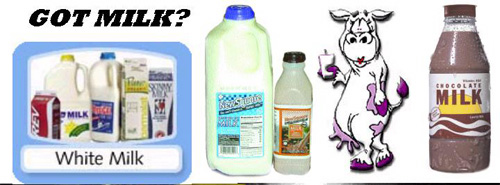Christopher LaCross
Got Milk?

One day in the third grade I can recall going through the lunch line in our school cafeteria. The cafeteria had that familiar smell that was like a mixture of stale pizza and dirty dishwater. As part of the lunch process we were served beverages such as milk and juice.
Upon sitting down at my sticky table I noticed that on that day I got white milk and some of the other students had chocolate milk. Not looking forward to the bland tasting white milk I was somewhat disappointed. A certain thought crossed my mind, which I vocalized to the other kids at my table. I said something to the effect of, “brown cows must be lucky because when they are babies they get chocolate milk”. Also, at this young age I had a skewed sense of anatomy, which prompted me to make my next statement. My next comment went something like, “black kids are lucky too because when they are babies they get chocolate milk”.
One of the other kids at the table told me I was stupid for what I said. Later, I discussed what happened with my mother. She made the point that I was confused. She told me that color didn’t matter and we all get white milk. So what did I learn about difference that day? I guess I learned that day, that at least in this particular sense, there was no difference.
The teachers at my school would talk to us about things like the color of our skin. They told us that color didn’t matter. I believed the teachers at my school and I didn’t see any reason why the color of one’s skin should matter either. My skin just happened to be black.
As I sat in the cafeteria on the cold, plastic chairs one day amongst all the rustling and bustling I heard another young boy talking about the difference between brown cows and white cows. He said something like “brown cows are lucky when they are babies because they get chocolate milk”. The boy then made a comment that sticks with me to this day, he said, “black kids are lucky too because when they are babies they get chocolate milk too”.
When I got home from school I told my mother about what I had heard. My mother had tried to talk to me about things like this before, but I believed what the teachers said at school. I believed that color didn’t matter. However, on this cold Flint, Michigan day I learned that it did matter and that I was different. The comparison between being black and being an animal made me feel inferior even though the other young boy thought black kids were lucky.
The young boy who said that my comment was stupid that day in the cafeteria happened to be black. I could see that my comments made him feel sad. I was very confused that my comments had this affect on him. I didn’t realize that my comments made him feel unequal.
I was really confused because my teachers told me that there was no difference and that we were all equal. I did not understand why this white boy was making me feel sad by saying mean things and comparing me to animals. Why was he making me feel like I was not the same? Maybe my mother was right after all.
My current perspective differs from the view I held as a young child. The year was 1982 when this incident took place and I was growing up in Flint, Michigan. Flint was a town that was devastated by the lay offs of multitudes of American car manufacturing employees. The town was also still struggling with racism. Much of the town was still segregated in a way. There was a white part of town and a black part of town.
I originally thought, when recalling this story, that the comment I made was innocent in nature. The incident was also initially meaningful to me because I thought it was somewhat humorous, but I have learned that there was more under the surface. Now I can see that the incident really stuck with me because I know deep down that it was really not innocent. I believe that the racist white dominant culture that surrounded me influenced me. The segregation of blacks and whites in different neighborhoods in town, the racial slurs I heard from relatives and other adults alike, and probably the media all helped to shape me, even as a young child.
In conclusion, the incident stuck with me because it was anything but innocent; it was about the reality of difference and inequality. In regard to why it happened, I think even when we are young we are influenced and shaped by the dominant culture in place. In this case it was and still is a racist, white dominant culture. Today, however, I am beginning to get an education on the unequal systems that are in place. Today I can look back and see that my comment may not have been so innocent, especially because it made a classmate feel different, inferior. I can interpret some of the social influences that shaped my understanding of race.
Return to Personal Memory Ethnographies
homepage